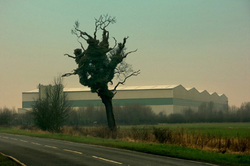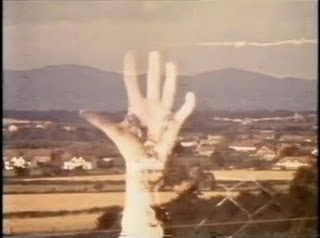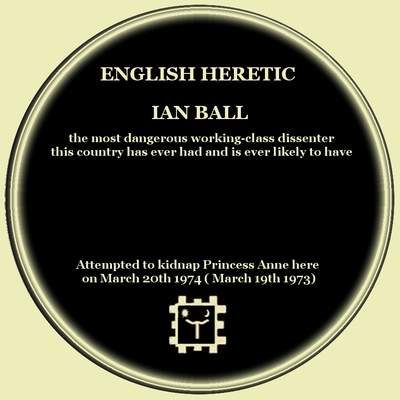April 27, 2011
Next week in NY
Next week: APA Studies presents: On Hauntology/ Capitalist Realism - 2 talks by Mark Fisher
THE COLLOQUIUM FOR UNPOPULAR CULTURE AND NYU’S ASIAN/ PACIFIC/ AMERICAN STUDIES PROGRAM present:
2 TALKS BY MARK FISHER
What are grey vampires and how do they retard the insurrectionary potential of digital discourse? How does Derrida’s notion of hauntology contribute to an understanding of dubstep artist Burial? Is ‘Basic Instinct 2’, routinely derided as a cine-atrocity, a Lacanian reworking of Ballard, Baudrillard and Bataille in service of the creation of a “phantasmatic, cybergothic London”? What is interpassivity and in what ways has it come to define the corporatized incarceration of modern academia?
Over the last decade, Mark Fisher has established a reputation as one of the exhilarating cultural theorists in Britain. A co-founder of the Cybernetic Culture Research Unit (CCRU) at Warwick University – and described by Simon Reynolds as the academic equivalent of Apocalypse Now’s Colonel Kurtz – he brings together psychoanalysis, political analysis and speculative fiction to create an extraordinary body of rogue scholarship, a theory-rush with few parallels.
Fisher is the author of ‘Capitalist Realism’, the editor of ‘The Resistible Demise of Michael Jackson’ (both Zer0, 2009), and writes regularly for Sight and Sound, Film Quarterly, The Wire and Frieze, as well as maintaining a well-known blog at k-punk.abstractdynamics.org. He teaches at the University of East London, Goldsmiths, University of London, and the City Literary Institute.
The Colloquium for Unpopular Culture and NYU’s Asian/ Pacific/ American Studies program are pleased to be hosting Fisher’s first talks in America.
http://pontone.pl/pontones-special-guest-mix-k-punk-the-metaphysics-of-crackle/
--
MARK FISHER, THERE ARE NON-TIMES AS WELL AS NON-PLACES: REFLECTIONS ON HAUNTOLOGY
 |  |

|   |
WHEN: Wednesday 4 May 2011, 6:30pm
WHERE: Room 471, 20 Cooper Square [East 5th and Bowery]
FREE AND OPEN TO THE PUBLIC
“Through their generic and transient qualities – workstations devoid of personal effects, relations with colleagues as fleeting as those with passengers on a commuter journey – many workplaces now resemble non-places, either literally, as in the case of a hotel, corporate coffee chain or out-of-town supermarket, or symbolically, in the form of temporary assignments for faceless employers (dis)located in anonymous buildings, where the worker-commuter then follows the same global timetables, navigates the same software applications and experiences the same sense of placelessness, the feeling of being mere data in the mainframe.”
So writes Ivor Southwood in his analysis of precarious labour, ‘Non-Stop Inertia’ (2011). In the last decade, the proliferation of corporate non-places has been accompanied by the spread of cyberspace-time, or Itime, a distributed or unpunctuated temporality. It’s no coincidence that, as this unmarked time increasingly came to dominate cultural and psychic space, Derrida’s concept hauntology (re)emerged as the name for a paradoxical zeitgeist. In ‘Specters of Marx’, Derrida argued that the hauntological was characterised by “a time out of joint”, and this broken time has been expressed in cultural objects that return to a wounded or distorted version of the past in flight from a waning sense of the present. Sometimes accused of nostalgia, the most powerful examples of hauntological culture actually show that nostalgia is no longer possible. In conditions where pastiche has become normalised, the question has to be: nostalgia compared to what?
James Bridle has recently argued that “the opposite of hauntology ... [is] to demand the radically new”, but hauntology in fact operates as a kind of thwarted preservation of such demands in conditions where - for the moment at least - they cannot be met. Whereas cyberspace-time tends towards the generation of cultural moments that are as interchangeable as transnational franchise outlets, hauntology involves the staining of particular places with time - albeit a time that is out of joint. In this lecture, Fisher will explore the hauntological culture of the last few years in relation to the question of place, using examples from music (Burial, The Caretaker, Ekoplekz, Richard Skelton), film (Chris Petit, Patrick Keiller) and fiction (Alan Garner, David Peace).
--
MARK FISHER, DEPACIFICATION PROGRAM: FROM CAPITALIST REALISM TO POST-CAPITALISM
WHEN: Thursday 5 May 2011, 6:30pm
WHERE: Room 471, 20 Cooper Square [East 5th and Bowery]
FREE AND OPEN TO THE PUBLIC
“It would be best, perhaps, to think of an alternate world - better to say the alternate world, our alternate world - as one contiguous with ours but without any connections or access to it. Then, from time to time, like a diseased eyeball in which disturbing flashes of light are perceived or like those baroque sunbursts in which rays from another world suddenly break into this one, we are reminded that Utopia exists and that other systems, other spaces, are still possible.” (Fredric Jameson, ‘Valences of the Dialectic’)
In his 2009 book ‘Capitalist Realism’, Mark Fisher started to explore some of the affective, psychological and political consequences of the deeply entrenched belief that there is no alternative to capitalism. After 1989, capital seemed to enjoy full spectrum dominance of both global space and the unconscious. Every imaginable future was capitalist. What has been mistaken for post-political apathy, Fisher argued, was a pervasive sense of reflexive impotence in the face of a neoliberal ideological program which sought to subordinate all of culture to the imperatives of business. The subject of post-Fordist capitalism is no passive dupe; this subject actively participates in an ‘interpassive’ corporate culture which solicits our involvement and encourages us to ‘join the debate’. As Fisher argues in the book, education has been at the forefront of this process, with teachers and lecturers locked into managerialist self-surveillance, and students induced into the role of consumers.
In the eighteen months since ‘Capitalist Realism’ was published, the neoliberal program has been seriously compromised, but capitalist realism has intensified - with austerity programs pushed through on the basis that it is unthinkable that capitalism should be allowed to fail. At the same time, this new, more desperate form of capitalist realism has also faced unexpected challenges from a militancy growing in Europe, the Middle East and even in the heartlands of neoliberalism such as the UK and the US. Now that history has started up again, and Jameson’s “baroque sunbursts” flare brighter than they have for a generation, we can begin to pose questions that had receded into the unimaginable during the high pomp of neoliberal triumphalism: what might a post-capitalism look like, and how can we get there?
Fisher will argue that the Left will only succeed if it can reclaim modernity from a neoliberal Right that has lost control of it. This entails understanding how the current possibilites for agency are contoured and constrained by the machinery of what Deleuze and Foucault called the Control Society, including cyberspace, the media landscape, psychic pathologies and pharmacology - failures to act are not failures of will, and all the will in the world will not eliminate capitalism. It also entails recognising that neoliberalism’s global hegemony arose from capturing desires which it could not satisfy. A genuinely new Left must be shaped by those desires, and not be lulled, once again, by the logics of failed revolts.
--
Queries: ss162@nyu.edu
The only royal wedding commentary you need
- What hope for a country where people will camp out for three days to glimpse the Royal Couple? Where one store clerk refers to another as his 'colleague'?
... God save the Queen and a fascist regime ... a flabby, toothless fascism to be sure. Never go too far in any direction is the basic law on which Limey-Land is built. The Queen stabilizes the whole stinking shithouse and keeps a small elite of wealth and privilege on top ....
The English have gone soft in the outhouse. England is like some stricken beast too stupid to know it is dead. Inglorioulsy foundering in its own waste products, the backlash and bad karma of empre. You see what we owe to Washington and the Valley Forge boys for getting us out from under this den of snobbery and accent, this ladder where everyone stomps discreetly on the hands below them:
"Pardon me, old chap, but you aren't you getting just a bit ahead of yourself in rather an offensive manner?"
... The English thing worked too well and too long. They'll never get all that ballast of unearned privilege up into space. Who wants that dumped in his vicinity? They get out of a spaceship and start looking desperately for inferiors.
- William Burroughs, The Place of Dead Roads
And the only royal souvenir you'll ever need ...
April 05, 2011
Music, Politics and Agency
A one-day conference presented by:
Centre for Cultural Studies Research, University of East London
Faculty of Social Sciences, Open University
Media Industries Research Centre, University of Leeds
May 20th 2011
11:00 - 18:00
University of East London
Docklands Campus
Room EB.2.43
permalink: http://culturalstudiesresearch.org/?p=694
Can music change anything, or does its potency lie merely in its exemplary status as an organised human activity? What are the effects of power relations on music and to what extent is music itself a site at which power relations can be reinforced, challenged or subverted? What are the economic, affective, corporeal or ideological mechanisms through which these processes occur? Has the age of recorded music as a potent social force now passed, a relic of the twentieth century; or with the music industry in crisis, is music culture in fact the first post-capitalist sector of the cultural economy, only now emerging from the long shadow of the culture industry? What historical or contemporary examples can we draw on to address some or all of these questions?
This conference is programmed by Jeremy Gilbert (Centre for Cultural Studies Research, University of East London), David Hesmondhalgh (Media Industries Research Centre, Institute of Communications Studies) and Jason Toynbee (Centre for Research on Socio-Cultural Change, Open University).
The conference is free to attend, but pre-registration is recommended.
To register email j.gilbert@uel.ac.uk with the subject “Music, Politics and Agency Registration”
For any further information, email j.gilbert@uel.ac.uk
UEL Docklands Campus is best reached via Cyprus DLR (Docklands Light Railway) station, which is literally located at the campus.
For information about the campus, see http://www.uel.ac.uk/campuses/docklands.htm
Room EB.2.43 is on the second floor of the main building (‘East Building’) which is to the left of the main square upon entering from the square from Cyprus DLR .
See http://journeyplanner.tfl.gov.uk/user/XSLT_TRIP_REQUEST2?language=en to plan your journey.
Speakers and Papers
Anne Danielsen
Power, mediation, and aesthetics in the music of Public Enemy
Anne Danielsen is Professor and Head of Research in the Department of Musicology at the University of Oslo. Her publications include Pleasure and Presence: the Funk Grooves of James Brown and Parliament (2006) and Musical Rhythm in the Age of Digital Reproduction (2010).
Barry Shank
The political agency of music
Barry Shank teaches popular music, American studies and cultural theory in the department of Comparative Studies at Ohio State University. He is the author ofDissonant Identities: The Rock'n'Roll Scene in Austin, Texas and A Token of My Affection: Greeting Cards and American Business Culture. He is currently completing a book for Duke University Press entitled Silence, Noise, Beauty: The Political Agency of Music.
David Hesmondhalgh
Music and human flourishing
David Hesmondhalgh teaches and researches at the University of Leeds. His books include Creative Labour: Media Work in Three Cultural Industries (2011), co-written with Sarah Baker, and Western Music and its Others: Difference, Appropriation and Representation in Music (with Georgina Born, 2000).
Helen Reddington
The sound of women musicians in the punk era
Helen Reddington lectures in songwriting and production on the University of East London's Music Cultures BA. Her research interests include the punk subculture and women's engagement with music technology. Her book The Lost Women of Rock Music will appear revised in paperback in January 2012 and a double CD of archive material by her punk-pop band is due to be released by the label Damaged Goods later this year.
Jeremy Gilbert
Music after capitalism? Culture, creativity and markets
Jeremy Gilbert is Reader in Cultural Studies at the University of East London. His publications include (with Ewan Pearson) Discographies: Dance Music Culture and the Politics of Sound (Routledge 1999) and Anticapitalism and Culture: Radical Theory and Popular Politics (Berg 2008). He is co-director of the Centre for Cultural Studies Research, editor of new formations and a founder member of Lucky Cloud Sound System.
John Street
Music as political thought and action: the arguments and the evidence
John Street is a professor of politics at the University of East Anglia. His latest book is Music and Politics, which is due to be published by Polity later this year. He is a member of the editorial group of the journal Popular Music.
Martin Stokes
Scale, agency and music in religious movements
Martin Stokes is University Lecturer in Ethnomusicology and Tutorial Fellow at St. John's College, University of Oxford. Martin is an ethnomusicologist with a particular interest in social and cultural theory. His most recent book The Republic of Love: Cultural Intimacy in Turkish Popular Music, has just been published by the University of Chicago Press (2010).
Tim Lawrence
Rhizomatic musicianship: Arthur Russell and after
Tim Lawrence is a Reader in Cultural Studies at the University of East London and the programme leader of the Music Culture: Theory and Production degree. He is the author of Love Saves the Day: A History of American Dance Music Culture, 1970-79 (Duke University Press, 2003) and Hold On to Your Dreams: Arthur Russell and the Downtown Music Scene, 1973-92 (Duke University Press, 2009). He is a founding member of the Centre for Cultural Studies Research and Lucky Cloud Sound System.
Tuulikki Pietilä
Body politic: youth musics in the “New South Africa”
Tuulikki Pietilä is a social anthropologist and a research fellow in the Helsinki Collegium for Advanced Studies. She has published a monograph and a number of articles on trade and gender in Kilimanjaro and the post-colonial Africa more broadly. Currently she is studying South African music and music industry.
